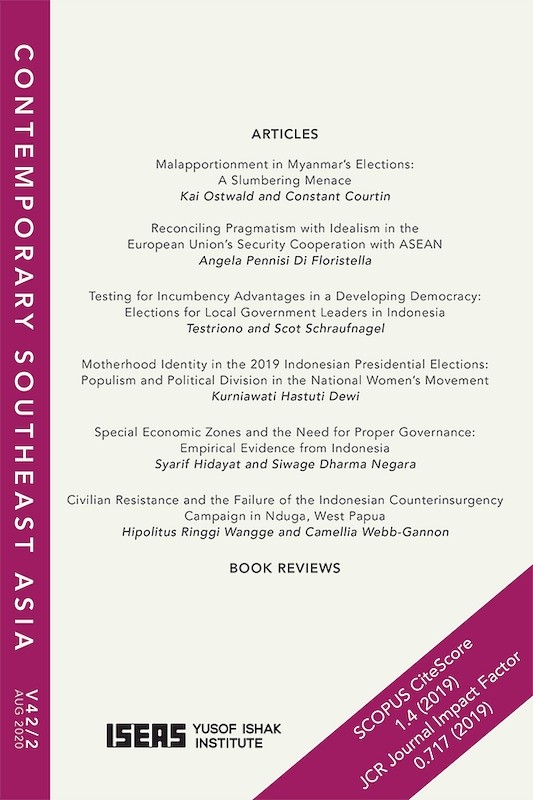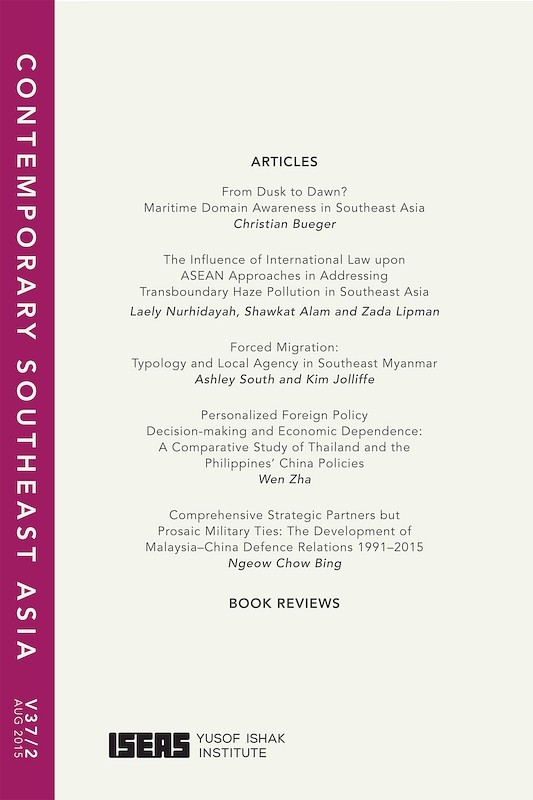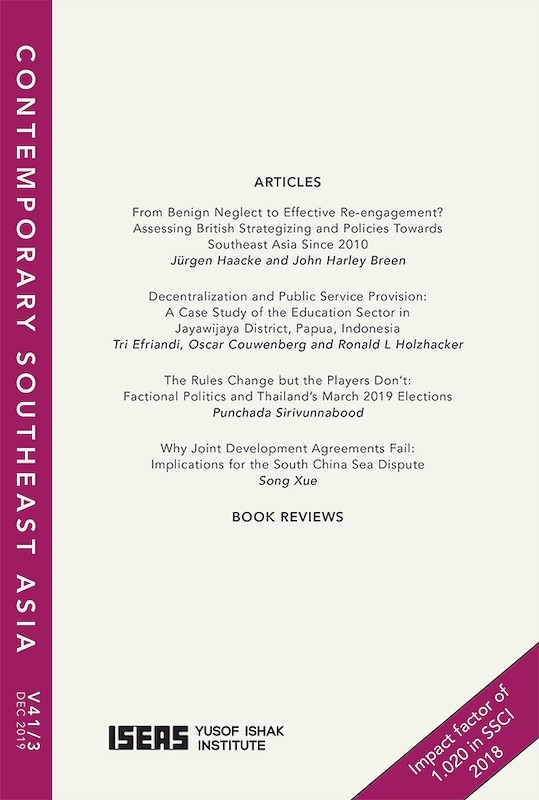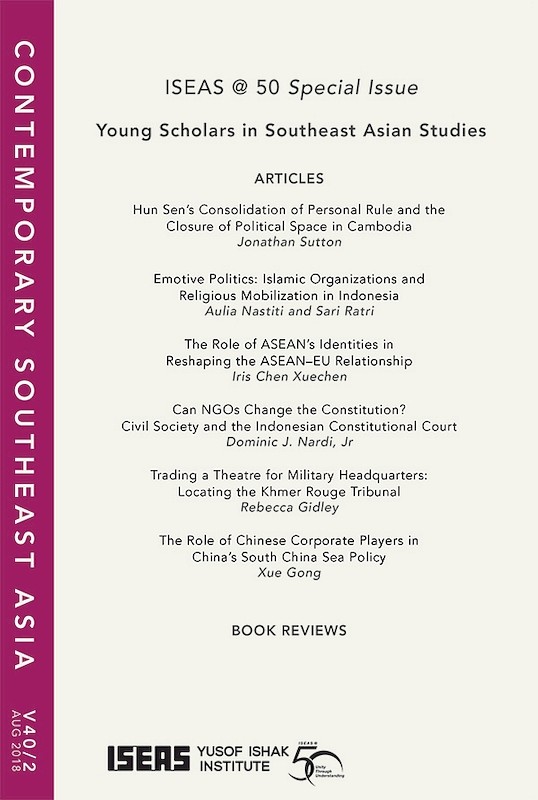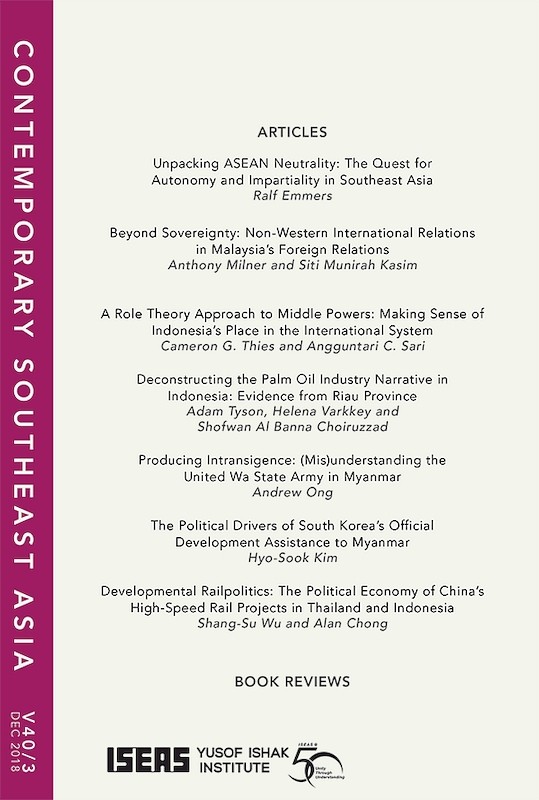Contemporary Southeast Asia Vol. 43/1 (April 2021)
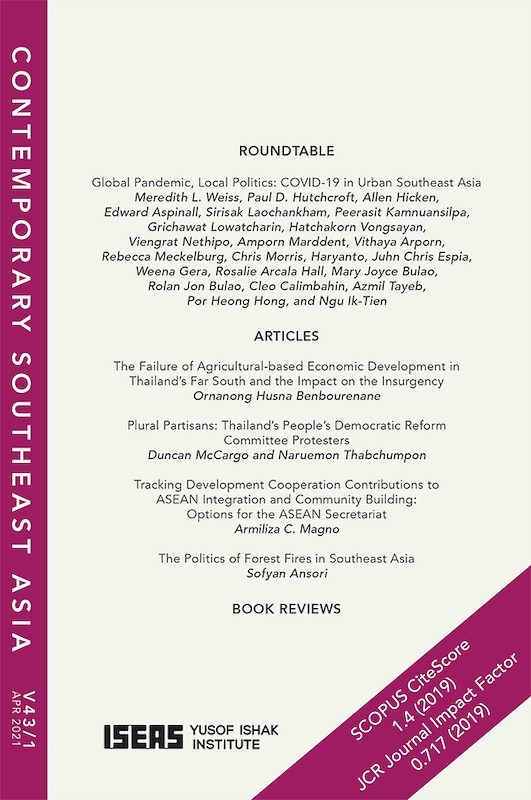
Date of publication:
April 2021
Publisher:
ISEAS – Yusof Ishak Institute
Number of pages:
224
Code:
CS43/1
About the publication
- Attained SCOPUS CiteScore of 1.4 in 2019.
- Attained Journal Citation Report (JCR) Journal Impact Factor of 0.717 in 2019.
- SCImago Journal and Country Rank (SJR) 2019 for the Asiatic Region: Ranked 1st in Political Science and International Relations; 1st in History; and 3rd in Arts and Humanities.
- Ranked 19th by Google Scholar Metrics 2020 in the category of “Asian Studies and History”.
Contents
-
Contemporary Southeast Asia Vol. 43/1 (April 2021)
[Whole Publication, ISSN: 1793284X] -
Preliminary pages
- ROUNDTABLE
-
1. Roundtable: Global Pandemic, Local Politics: COVID-19 in Urban Southeast Asia, by Meredith L Weiss, Paul Hutchcroft, Allen Hicken, Edward Aspinall, Sirisak Laochankham, Peerasit Kamnuansilpa, Grichawat Lowatcharin, Hatchakorn Vongsayan, Viengrat Nethipo, Amporn Marddent, Vithaya Arporn, Rebecca Meckelburg, Chris Morris, Haryanto, Juhn Chris Espia, Weena Gera, Rosalie Arcala Hall, Mary Joyce Bulao, Rolan Jon Bulao, Cleo Calimbahin, Azmil Tayeb, Por Heong Hong, Ngu Ik-Tien, authors
- ARTICLES
-
2. The Failure of Agricultural-based Economic Development in Thailand’s Far South and the Impact on the Insurgency, by Ornanong Husna Benbourenane, author see abstractThis article traces Thailand’s economic development policies in Pattani, Yala and Narathiwat, with a specific focus on agricultural development since the resurgence of ethnic conflict in the Far South in 2004. It discusses how successive Thai governments have attempted to use economic development to win the “hearts and minds” of the region’s Malay-Muslim population. As the agricultural sector provides the main source of income for more than 50 per cent of the Far South’s population, this articles offers a closer look at the interaction between agricultural policy, income distribution and the ongoing conflict. It highlights the impact of the government’s agricultural policy and the violent unrest on the region’s economic development between 2004 and 2020. It discusses the manner in which the three Far South provinces have slipped into poverty and the impact this has had on the separatist insurgency. Due to weak economic development and little prospect of a political solution to the ethnic conflict, this article concludes that prospects for peace and prosperity in the Far South remain bleak.
-
3. Plural Partisans: Thailand’s People’s Democratic Reform Committee Protesters, by Duncan McCargo, Naruemon Thabchumpon, authors see abstractThe 2013–14 People’s Democratic Reform Committee (PDRC)—a mass protest movement that occupied a number of major Bangkok traffic intersections—bears a significant degree of responsibility for the fact that Thailand remains under a hybrid form of military rule today. Nevertheless, close scrutiny of the PDRC reveals that the movement was more diverse and wide-ranging than previously understood. Like the earlier People’s Alliance for Democracy (PAD), which staged anti-Thaksin rallies in 2006 and 2008, the PDRC was in fact a broad church of factions and individuals, united by little more than a shared disdain for the then government of Prime Minister Yingluck Shinawatra. Drawing on 48 interviews conducted with PDRC protesters in 2014, this article examines the diverse motives and circumstances that explained individual participation in these important protests.
-
4. Tracking Development Cooperation Contributions to ASEAN Integration and Community Building: Options for the ASEAN Secretariat, by Armiliza C. Magno, author see abstractThis article argues that while the Association of Southeast Asian Nations (ASEAN) has made significant strides in monitoring its progress towards the ASEAN Community Vision 2025, it still lacks a robust monitoring and evaluation (M&E) regime that can properly measure and assess the contributions made by regional development cooperation initiatives to the attainment of that vision. To answer the questions of why and how ASEAN should enhance its monitoring of regional development cooperation, this article first discusses how ASEAN’s governance framework has evolved to meet its regional integration agenda before examining development cooperation in ASEAN and the important role that monitoring can play in ensuring that such initiatives are in congruence with the notion of ASEAN Centrality. The article then analyses ASEAN’s current M&E systems in greater depth in order to explain how the organization’s monitoring and evaluation capacity of development cooperation is hampered by weaknesses in defining the parameters of success, linking implementation monitoring to results monitoring and engendering institutional learning opportunities. It then offers six concrete steps that can be adopted to address these shortcomings, primarily involving improvements to the collection, classification and dissemination of data.
-
5. The Politics of Forest Fires in Southeast Asia, by Sofyan Ansori, author see abstractThis article explicates the relationship between forest fires and political processes in Southeast Asia. Forest fires in Southeast Asia have been identified as man-made disasters caused by the excessive extraction of forest resources and the conversion of forests into profit-oriented landscapes. Recurrent forest fires are primarily blamed on the perpetuation of colonial practices in the forestry sector. However, this argument does not sufficiently explain the parallel patterns of forest extraction—including in countries with no experience of formal colonialism—and the differing impacts of forest fires across the region. Using fire datasets and cases from Indonesia, Thailand and Myanmar, this article offers a comparative lens to understand why forest fires matter to Southeast Asia and why, compared to other countries, Indonesia suffers the greatest from forest fires, politically and economically. I argue that this is because political elites and oligarchs in Indonesia have neglected the environmental risks of peatland resources. This argument marks a significant break from the colonial legacy argument and explains the distinct implications of forest fires for the Indonesian economy and politics.
- BOOK REVIEWS
-
BOOK REVIEW: Shields of the Republic: The Triumph and Peril of America’s Alliances, by Mira Rapp-Hooper, by Hunter Marston, author
-
BOOK REVIEW: China’s Maritime Silk Road: Advancing Global Development? by Gerald Chan, by Chris Rahman, author
-
BOOK REVIEW: Fishers, Monks and Cadres: Navigating State, Religion and the South China Sea in Central Vietnam. By Edyta Roszko, by Nguyen Khac Giang, author
-
BOOK REVIEW: Towards a New Malaysia? The 2018 Election and Its Aftermath, edited by Meredith L. Weiss and Faisal S. Hazis, by Francis E Hutchinson, author
-
BOOK REVIEW: Unravelling Myanmar’s Transition: Progress, Retrenchment, and Ambiguity Amidst Liberalization, edited by Pavin Chachavalpongpun, Elliott Prasse-Freeman and Patrick Strefford, by Tan, Felix Thiam Kim, author
-
BOOK REVIEW: Everyday Justice in Myanmar: Informal Resolutions and State Evasion in a Time of Contested Transition, edited by Helene Maria Kyed, by Kai Ostwald, author
-
BOOK REVIEW: Rivalry and Response: Assessing Great Power Dynamics in Southeast Asia, edited by Jonathan R. Stromseth, by Le Dinh Tinh, author


